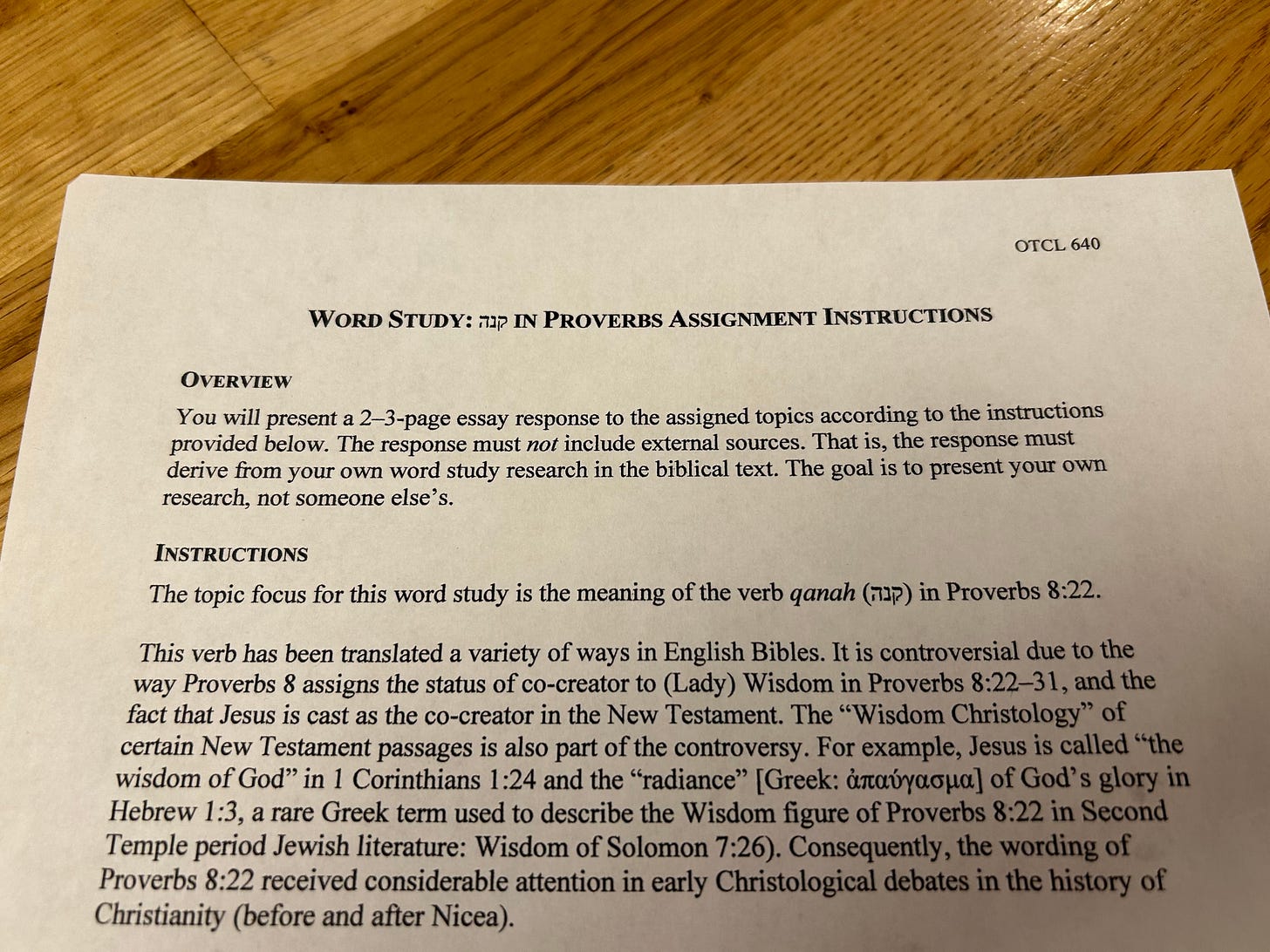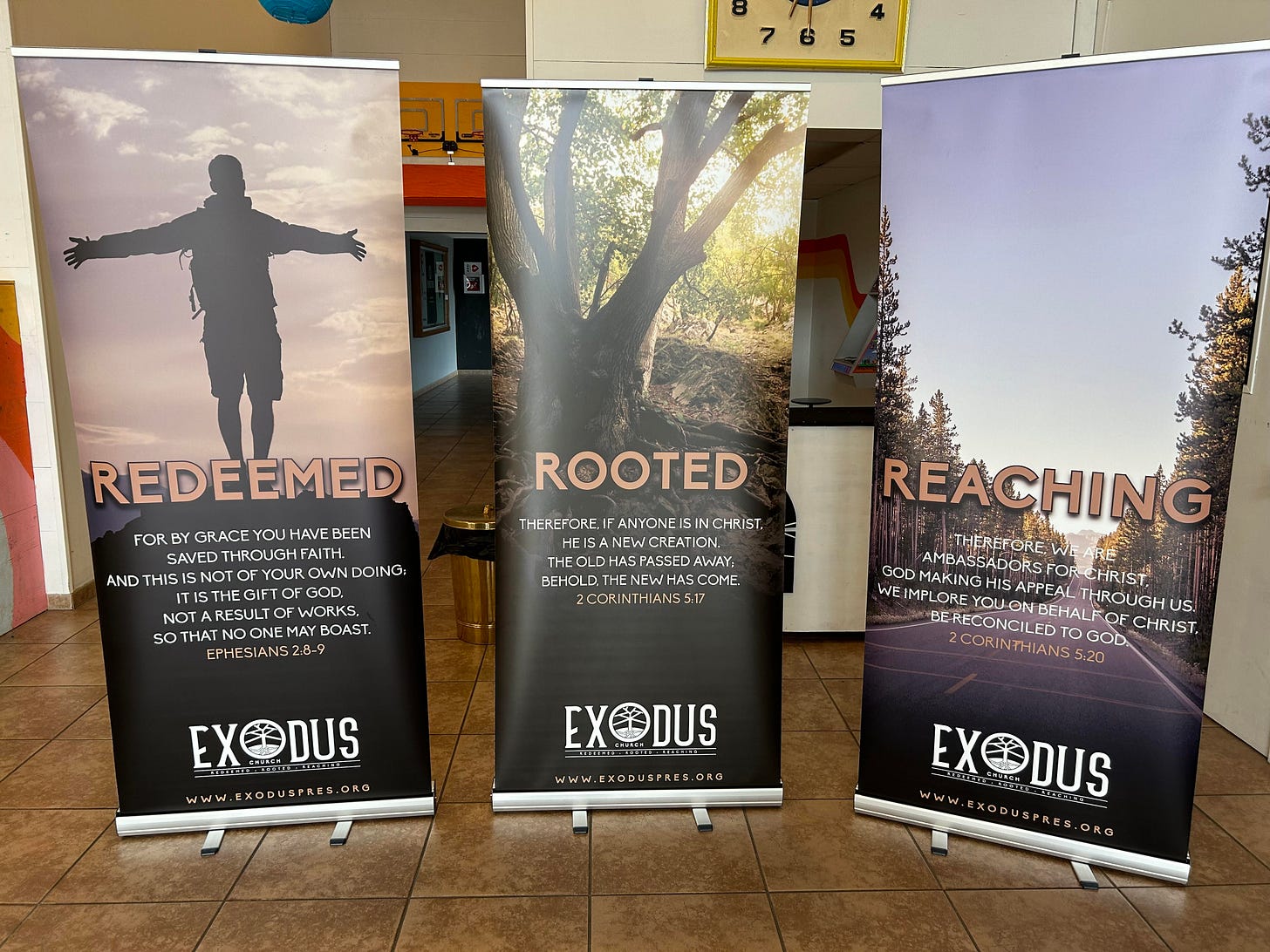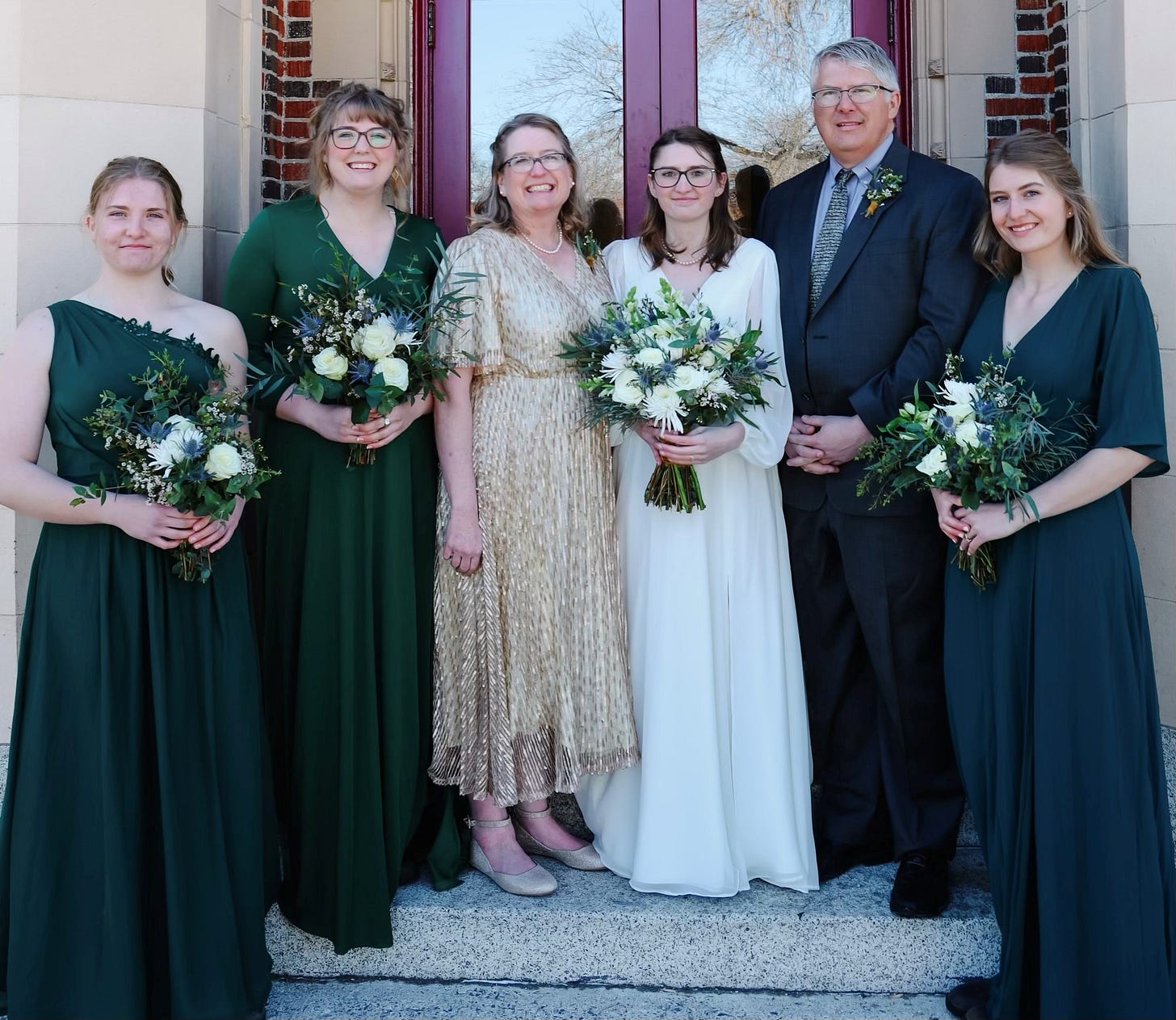Planning for Exodus
Counting Costs, Setting Sights
Dear Friends,
I’m a few weeks later than planned with this month’s newsletter, but there’s plenty happening. Our latest updates (with even more details below):
Exodus Church and the Presbytery of Northern Illinois have settled on my initial job description and approved budget; to be as available to the church as possible, I hope to supplement my church salary the first two years by fundraising rather than FedEx delivery
By request of the church, we’re moving up my departure from Bozeman from the end of July to the middle of June; Megan will remain in Bozeman soaking up time with Maddie and Millie until I return at the end of July to drive her and the rest of our things to Illinois
Megan is in final stages of interviewing with two Christian schools that both want her to teach for them but are still finalizing their needs for this fall; so, we hurry up and wait
We’ve secured a Springfield realtor and are pre-qualified with a lender in hopes of buying a house; we’ve seen plenty we like within our budget (we only need one!)
I have two weeks left in my Hebrew Exegesis class and things are going well; it’s been a long three courses over the winter, but I just have two exegetical papers to go!
Here are two notes we received in response to last month’s letter, the first from a pastor’s wife:
“I must tell you how I smiled while reading this and how my heart was warmed. I especially appreciated the specifics you shared of Spurgeon’s thoughts on evaluators of one’s call to ministry (or to pastor, more specifically). I see how applicable these are to my husband’s role. I only wish I had read this lecture years ago as I found it quite enjoyable and life-confirming. I plan to share it with my husband as I suspect he will appreciate it as much as I. I am happy to read of the many blessings you and your wonderful family are sharing.”
And this from a friend in upstate Illinois:
“I appreciated reading your review on Jesus Revolution. Hoping to catch that at some point here, either while in still in the theater or, more likely, once it comes to Blu-ray/On Demand/HBO Max/etc. I knew you would be someone who would have some interesting insight on a ‘Christian movie,’ and you didn’t disappoint. Thanks for sharing your thoughts and perspectives.
Continued best wishes for smooth transitions as you plot your course back to the Midwest along with everything that goes with that—the schooling, the job search for Megan, etc. I know that is a major life change that will carry as many emotional challenges as it will excitement, and I’ll be continually thinking about and praying for you.
Selfishly, I’ll be excited that this move means that I may be able to periodically connect with you in person, either somewhere near the Springfield area or perhaps an annual or semi-annual meeting for lunch somewhere in the middle. Thanks for sharing some detailed updates on the process!”
We’re always glad to hear from readers, so feel free to reach out via email, text, or phone (406-595-0446). And, as always, thanks for reading this month’s Second Drafts.
Craig (for Megan)
PS: For subscribers (especially those new to Second Drafts) interested in the story leading up to this summer’s move from Bozeman to Springfield, you can read more about it here:
The World Is Too Much with Us (September 2022)
A Vision Worthy of the Rest of Our Lives (January 2023)
A Vicarious View (February 2023)
Seeds of My Pastoral Pursuit (March 2023)
Redeemed, Rooted & Reaching

In his spring update from Midwest Alliance, a regional Presbyterian Church in America (PCA) church planting partnership, director Ted Powers writes:
“Over the last several months I’ve been asked multiple times, ‘How has church planting changed over the years? What changes are you seeing in how churches are planted these days?’”
After a concise and helpful summary of what he thinks hasn’t changed about planting a church—connecting in the community, building relationships, casting vision, forming and equipping a core group and launch team, finding a place to meet, “praying, praying, praying”—Ted answers the question:
“I’d say the biggest change is that one has to be prepared for the long haul more than ever. It often takes much longer to plant a biblically healthy, outwardly focused church these days in our increasingly secularized culture. For years the expected timetable was to be self-sustaining and self-governing in about three years. And there are still situations where that is very appropriate. But more often than not, we need to think in terms of 4-5 years, and frequently 6-7, and sometimes, even 10.”
Ted’s brief article is worth a read, particularly for those not familiar with the PCA variety of church planting; in fact, the whole site is helpful in learning more of what Megan and I are committing ourselves to.
Put simply, the goal is not to plant churches that “steal” members from other existing churches or grow congregations into “megachurches” that inevitably create inwardly-facing subcultures. We want to walk with people in and through the highs, lows, and plateaus of life—from birth to death, in joys and sorrows, and everything in between—and help establish a solidly biblical, Reformed church in Springfield.
As Exodus Church’s mission banners succinctly summarize, Megan and I want to help establish this growing church plant of people who are:
redeemed—from enslavement of sin, shame, and bad decisions done by/to others
rooted—in covenant grace and truth, the motivation and instruction for obedience
reaching—in a way that invites others to come and see the love and life of Jesus
This three-fold harvest is the hoped-for outcome of Exodus Church and Springfield, and if God blesses in a such a way in our lifetimes, for eventual daughter churches throughout central Illinois as well.
My Role
Because I will not be ordained (yet) when we move to begin at Exodus Church, my title will be Ministry Coordinator, which means I’ll handle a good amount of logistics and coordination work for the church. The tentative broad brush job description:
Collaborate on planning worship services and liturgies
Help organize life-on-life discipleship groups/small groups
Recruit, train, equip, and shepherd Sunday morning operations including:
Worship team
A/V set up/tear down
Children’s ministry and nursery operations
Hospitality team set up
Work with office admin to best implement church-wide organization/systems
Planning center, people, groups, calendar, services, church center app
Coordinate and respond to admin, website, and communication inquiries
Edit and print bulletins
Give attention to potential Ministry to State (future)
In the midst of these formal responsibilities, there will be much informal relational work to do—meeting people, engaging in and learning more about their needs, reacquainting myself in general with the Midwest—as well as finding ways to serve and help Stephen Lawrence and his wife, Courtney, in his role as planting pastor.

Counting the Costs
Exodus Church is just over two years old and still very much a church plant; that is, in PCA-speak, it has not yet “particularized” in having its own elders and self-sustaining budget. Thankfully, this is where a strength of the PCA really shines, as other elders from the Presbytery of Northern Illinois (of which Exodus is a part) serve as a temporary elder board until local elders are trained and ready, and the presbytery commits start-up and sustaining funds for four years to the church.
Specific to me, both the church and the presbytery have each committed $1,000/month for two years toward a base salary, which will provide $24,000 annually. This is more than we anticipated, so we’re grateful for their generosity.
Springfield definitely has a more average standard of living than Bozeman; however, while we have no debt, neither do we have equity since we have rented all eight years in Montana (Bozeman median home prices are eight times higher than Springfield, but Illinois families pay the highest state and local taxes in the country).
Megan is in final discussions with two Christian schools in Springfield that have communicated a desire for her to teach for them; unfortunately, they are still finalizing their needs for next school year and neither has extended a formal offer.
And, of course, there are moving costs to get us from here to there, but we have some savings to help with those.
A Possible (But Not Ideal) Solution
Because Exodus Church is a plant with a limited budget, one of my motivations to begin driving for FedEx back in January (in addition to getting in better shape—so far, I’ve dropped 30 pounds) was to take a job that might transfer in case the church couldn’t fully afford a new staff member and I needed to work bi-vocationally.
Having driven delivery for almost four months now, the FedEx scenario is still a “tent-making” possibility, but it’s definitely not an ideal one. Though I’ve gotten to know those I work with and have connected with hundreds of new people in 1-2 minute snippets across the day, the hours required to empty a truck vary significantly, depending on the day’s freight; some days I’m done by 2:30 p.m, others I’m delivering the last package at 6:30 p.m. This makes scheduling time with people difficult.
In addition, the work is physically demanding, which has been fine and I’ve even enjoyed, but I’ve needed the evenings to recover and turn in early. This doesn’t bode well for being with people when they’re more available before or after work (and lunchtime doesn’t really work, either, as the break is only half an hour…if one takes it).

Finally (and because of the combination of the two aforementioned realities), my studies—Hebrew for now, ordination studies this fall, eventual teaching preparation beyond—have been/would be relegated exclusively to Saturdays and Sundays. I’ve made it work (some weeks better than others), but any pastor worth his salt will tell you that’s not beneficial or sustainable—for the pastor or for his people.

A Better Alternative?
Back in January, when Megan and I were in Springfield to meet core members of the church plant, she and I talked about different funding possibilities for the move. I was due to start at FedEx the following week, quite sure that transferring the driving to Springfield six months later was a clever way to go (I didn’t know what I know now).
It was Megan who, on the heels of seeing the potential of what was going on in Springfield and knowing my heart to pastor, suggested that, rather than try to cobble together the remaining needed funds, we trust God to provide them through others so I can give myself fully to the ministry. I recall being struck by Megan’s faith in suggesting this (we raised support the first 10 years of our marriage and she bore the brunt of those financially lean years), but it seemed of the Lord.
After further discussion and prayer, I put some numbers together and proposed the idea to Stephen and Greg Grindinger (the pastor representing the presbytery) as part of our budget discussions. After committing the $2,000 a month in church and presbytery support, they were glad for me to try to raise the remaining $1,500/month we estimate we’ll need over the next two years—a total of $36,000 (or $18,000/year).
Here’s the breakdown of how my salary would be sourced (the green slice of the pie is what I hope to raise between now and June 1):
The breakdown of the $18,000 is $1,500/month and can be reached many different ways. Here’s one scenario with just 20 people/families giving monthly for one year:
1 person/family giving $200/month for 12 months = $2,400
4 people/families giving $100/month for 12 months = $4,800
6 people/families giving $75/month for 12 months = $5,400
9 people/families giving $50/month for 12 months = $5,400
= $18,000
If 40 people/families committed to similar levels for 12 months, both years would be covered:
2 people/families giving $200/month for 12 months = $4,800
8 people/families giving $100/month for 12 months = $9,600
12 people/families giving $75/month for 12 months = $10,800
18 people/families giving $50/month for 12 months = $10,800
= $36,000
We don’t know your specific financial situation, but you can see what ours will be. Even if Megan lands a teaching position (which we hope she does), Christian schools pay less than public schools, so we don’t anticipate her salary to be over $30,000 a year.
Exodus Church has set up a special link for friends who want to contribute to help us meet our part of the goal. The form is simple, and donors can specify if they prefer to give regularly (weekly or monthly) or make a one-time gift, as well as elect to cover the administrative fees associated with our fundraising (which is helpful). All gifts are tax-deductible, and we’ll be sure to communicate our thanks for your gift of support.
If all goes well and the money gets raised, I hope to be full-time with Exodus come June 15th. We’d appreciate your prayerful consideration in joining our support team. If you have questions about our fundraising, please contact me.
Q&A
As we finish up this newsletter, here are a few of the most frequently asked questions we get, along with our best answers. Something else you’d like to know? Email me.
Is there a deadline for the funding? What if you go over/under?
We need to have $18,000 committed for the first year by June 1. This will help us make the decision of whether I need to start looking for a part-time job (with FedEx or someone else) in Springfield or if I can start full-time with Exodus on June15.
Whatever funding comes in between now and then will be held in our account and then applied to my salary on a monthly basis, beginning mid-June. Should funding come in above our year one goal, it will be held in our account and applied to the second year, beginning in June 2024.
If we don’t reach our fundraising goal, I’ll look for a part-time job to help make ends meet, but that will take away time I can devote to the church, which is our priority.
When are you planning to pack and move?
Right now, the plan is to wait until June before we start packing in earnest. Two primary reasons: 1) we want Millie (who will be returning May 9 from Covenant College and working here in Bozeman this summer as a nanny/tutor) to get at least a month of semi-normalcy before we start boxing things up; and 2) we want Megan to be able to focus on finishing well teaching at Petra Academy.
Because of the needs in Springfield, Stephen has asked if I can start earlier in the summer than when we were originally planning, which I can do if our funding comes in. It’s still very general, but here’s a tentative timeline with the pertinent dates:
May
9 - Millie gets home for summer from Covenant College
12 - Craig finishes Hebrew Exegesis; submits exegetical paper to presbytery
Craig continues driving for FedEx
Megan continues teaching at Petra Academy
June
1 - Fundraising deadline (year one)
2 - Megan’s last day at Petra Academy
Craig and Megan begin packing
9 - Craig’s last day at FedEx
10-12 - Craig drives to Illinois
13-15 - Craig drives to and attends the PCA General Assembly in Memphis
15 - Craig returns to Springfield and officially begins with Exodus Church
July
Megan continues packing
19 - Craig flies back to Bozeman
23 - Last Sunday at Trinity Church
24-26 - Craig and Megan move to Illinois
August
TBD - Megan’s first day teaching at TBD
How are you planning to move?
This depends on two things: 1) figuring how many of our earthly possessions (read: books) we’re going to take; and 2) whether we’ll have found a house by the time I get to Springfield. After having driven a 30-foot truck for FedEx for what will then be five months, the idea of driving cross-country in a rental truck is not intimidating.
Have you found a place to live in Springfield?
Not yet, but we have a realtor we met in January and are pre-qualified with a lender. We’ve seen multiple great houses come and go on realtor.com and trust there’s still one more out there for us. It would be nice to have a place upon my arrival mid-June or by Megan’s arrival at the end of July, but we’ll see.
How are the girls doing in processing the move?
Maddie, Chloe, Katie, and Millie are busy with their own lives and ministries in their respective corners of the world, but they’re excited for our move. Having lived in St. Louis for six years during our seminary years and making monthly trips to the farm was very formative in developing their own love for the Midwest and the people there.
Maddie probably feels the pain the most, as she is the one member of the family remaining in Montana after everyone else has (or will have) departed in a year’s time (Millie and Chloe this past August; Katie this past January; me in June; Megan in July). We’re hoping to have everyone together in Illinois at Thanksgiving or Christmas, though, and will just continue working hard at staying close despite the miles.
Finally, in case anyone is wondering, Peaches is fine, but she and I are both going to suffer some withdrawal when we’re away from each other for six weeks this summer.
How can I pray?
Not much has changed on this list from last month. Please pray God’s will for us:
For a timely and generous response to our request for financial support
For a home in central Springfield that we can call our own and share with others
For a teaching position for Megan at one of the Christian schools in Springfield
For a strong finish to Hebrew and a good effort in writing the exegetical paper
For good and meaningful closure with friends in Bozeman
For courage to meet and make new friends in Springfield
Many of you (particularly those in Pike County) are aware that my 81-year-old still-farming father, Roger, has been in the hospital this past week due to shortness of breath and heart irregularities complicated by the end of planting season. The good news is the crops are in and Dad feels better. Pray he will be able to come home soon.
Peaches’ Picks
When I’ve not been working on Hebrew, Peaches and I have been trying to squeeze in some recommended reading from one of my pastors at Trinity Church. He emailed:
“I ordered you a book today. I read Reset several years ago when I was burnt out and it refreshed me as I reconsidered many of my pastoral practices. I hope it gives you some helpful ideas as you begin this new chapter of ministry.”
The book is addressed to Christian men in general, but with a regular focus upon Christian ministry leaders in particular. Since the author, David Murray, is a pastor, adjunct professor, and counselor, there is a little more theological and practical depth informing the book’s “living a grace-paced life in a burnout culture” subtitle than other popular Christian books. Still, it is quite accessible to a lay audience.
Peaches and I are a fourth of the way through the book and gleaning some good insights as we process the past and think about the future through the “reset” lens. I especially appreciated this observation from page 39:
“Many of our problems happen not only because we do the wrong things, but also because we believe the wrong things. Behind many seemingly practical problems are theological problems. At the root of many of the issues…is a wrong view of God. And it’s not just a slightly wrong view; it’s a fundamental and foundational error, because it concerns the fundamental and foundation truth that God is our Creator. That’s the very first truth revealed to us in Scripture. And it’s first for a reason: if we go wrong there, we run a great risk of going wrong everywhere else. Forgetting we are Christians has serious consequences, but so does forgetting we are human.”
You can order your copy of the book here. If you read it, let us know what you think.
Thanks again for considering becoming part of our support team. Until next month!
Know someone who might be interested in our plans in Springfield? Let them know!






